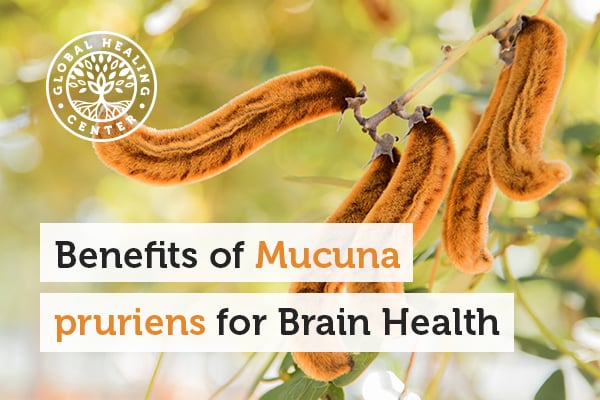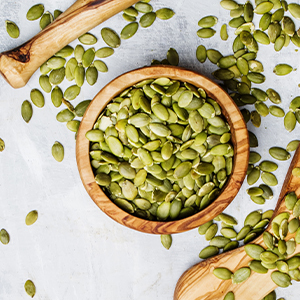
Long before chemicals, labs, and appointed health authorities, natural plants and practical knowledge formed the foundation for medicine. Indian Ayurvedic medicine, one of the oldest holistic medical modalities, cataloged the therapeutic properties for thousands of plants. While pharmaceutical marketing might make us wonder how we ever survived without prescription drugs, ancient knowledge has made its way back into the conversation. More than ever before, research is beginning to focus on ancient plants, herbs, flowers, and roots.
Mucuna pruriens, a tropical legume also known as velvet bean, has been used by ancient healers and is making waves in the scientific community. Ayurvedic herbal medicine has relied on Mucuna pruriens since 1500 BC to support ailments such as snakebite, intestinal disorders, sexual response, and melancholy mood.
What are the Active Compounds in Mucuna pruriens?
The magic of every therapeutic plant resides in its beneficial, bioactive compounds. The interaction between these compounds is typically responsible for the plant's favorable effects. In Mucuna pruriens, levodopa, or L-dopa, is one of these compounds.[1, 2] This bioactive phytochemical is a precursor to several neurotransmitters, including adrenaline, noradrenaline, and dopamine.
Mucuna pruriens has significant antioxidant action that works in tandem with L-dopa to promote brain health.[3] When L-dopa crosses the blood-brain barrier, it helps to increase brain levels of dopamine, an essential neurotransmitter associated with regulating mood and cognition.[4] Antioxidants are helpful for defending against oxidative damage by free radicals.[5]
How Does Mucuna pruriens Influence Brain Health?
Mucuna pruriens protects the brain by keeping cognitive and neural functions in check, even encouraging neural activity.[6] Its antioxidant action is likely responsible. The mechanism behind this is simple — all free radicals have an unpaired electron that makes them unstable in the body. Antioxidants donate an electron to the free radical to neutralize its effects, particularly on the brain. Mucuna has an added benefit in that it fights systemic redness in the brain, which is often a factor in brain degradation.[7]
Does Mucuna pruriens Counteract the Effects of Stress?
Ayurvedic tradition uses Mucuna pruriens to positively promote mental health and stress response. Men who experienced psychological stress reported that supplementation with Mucuna pruriens significantly eased their symptoms.[8] It seems that Mucuna pruriens reactivates the antioxidant defense system, an essential biological mechanism necessary for maintaining homeostasis within the body.
Is a Therapy for Parkinson's Disease on the Horizon?
Parkinson's disease is partially characterized by decreased brain production of dopamine, an essential neurotransmitter. Because Mucuna pruriens positively influences dopamine levels, it's been an Ayurvedic therapy for centuries. Preliminary research indicates that the natural form of L-dopa in Mucuna pruriens provides equivalent or better results compared to synthetic levodopa; and without the common side effects of nausea, vomiting, and involuntary muscle movement.[9, 10] Now, should it be inferred that Mucuna pruriens is a cure or treatment for Parkinson's? Not in the least. Is this study interesting in a hopeful sense though? Absolutely.
Supplementing with Mucuna pruriens
Mucuna pruriens has a rich history of use for promoting mental health. Current research supports its traditional application. If you are considering supplementing with Mucuna pruriens, like any supplement, it's a good idea to find an organic or wildcrafted source.
Mucuna is available in supplement form either by itself or combined with other herbs. I personally recommend Stress Relief, a potent blend of the best botanicals for brain health. Stress Relief also contains zinc and lithium orotate, two minerals shown to promote a positive mood.
References (10)
- Uma S, Gurumoorthi P. Dietary antioxidant activities in different germplasms of Mucuna. J Med Food. 2013 Jul;16(7):618-24. doi: 10.1089/jmf.2012.2697.
- Prakash D, Niranjan A, Tewari SK. Some nutritional properties of the seeds of three Mucuna species. Int J Food Sci Nutr. 2001 Jan;52(1):79-82.
- R. Katzenschlager, A. Evans, A. Manson, P. Patsalos, N. Ratnaraj, H. Watt, L. Timmermann, R. Van der Giessen, and A. Lees. Mucuna pruriens in Parkinson's disease: a double-blind clinical and pharmaceutical study. Journal of Neurology, Neurosurgery and Psychiatry. December 2004; 75(12): 1672-1677. dpi: 10.1136/jnnp.2003.028761.
- Amy F.T. Arnsten, Min J. Wang, Constantinos D. Paspalas. Neuromodulation of Thought: Flexibilities and Vulnerabilities in Prefrontal Cortical Network Synapses. Neuron, Volume 76, Issue 1, 223-239, 4 October 2012. 10.1016/j.neuron.2012.08.038.
- Yadav SK, Prakash J, Chouhan S, Singh SP. Mucuna pruriens seed extract reduces oxidative stress in nigrostriatal tissue and improves neurobehavioral activity in paraquat-induced Parkinsonian mouse model. Neurochem Int. 2013 Jun;62(8):1039-47. doi: 10.1016/j.neuint.2013.03.015. Epub 2013 Apr 3.
- V. Bala, A. Debnath, A.K. Shill and U. Bose. Anti-inflammatory, Diuretic and Antibacterial Activities of Aerial Parts of Mucuna pruriens Linn. International Journal of Pharmacology. 2011. Volume 7, Issue 4, pg. 498-503. doi: 10.3923/jp.2011.498.503.
- Yadav SK1, Prakash J2, Chouhan S3, Westfall S4, Verma M5, Singh TD6, Singh SP7. Comparison of the neuroprotective potential of Mucuna pruriens seed extract with estrogen in 1-methyl-4-phenyl-1,2,3,6-tetrahydropyridine (MPTP)-induced PD mice model. Neurochem Int. 2014 Jan;65:1-13. doi: 10.1016/j.neuint.2013.12.001. Epub 2013 Dec 11.
- Shukla KK, Mahdi AA, Ahmad MK, Jaiswar SP, Shankwar SN, Tiwari SC. Mucuna pruriens Reduces Stress and Improves the Quality of Semen in Infertile Men. Evid Based Complement Alternat Med. 2010 Mar;7(1):137-44.
- Tharakan B, Dhanasekaran M, Mize-Berge J, Manyam BV. Anti-Parkinson botanical Mucuna pruriens prevents levodopa induced plasmid and genomic DNA damage. Phytother Res. 2007 Dec;21(12):1124-6.
- Ramya KB, Thaakur S. Herbs containing L- Dopa: An update. Anc Sci Life. 2007 Jul;27(1):50-5.
†Results may vary. Information and statements made are for education purposes and are not intended to replace the advice of your doctor. If you have a severe medical condition or health concern, see your physician.







